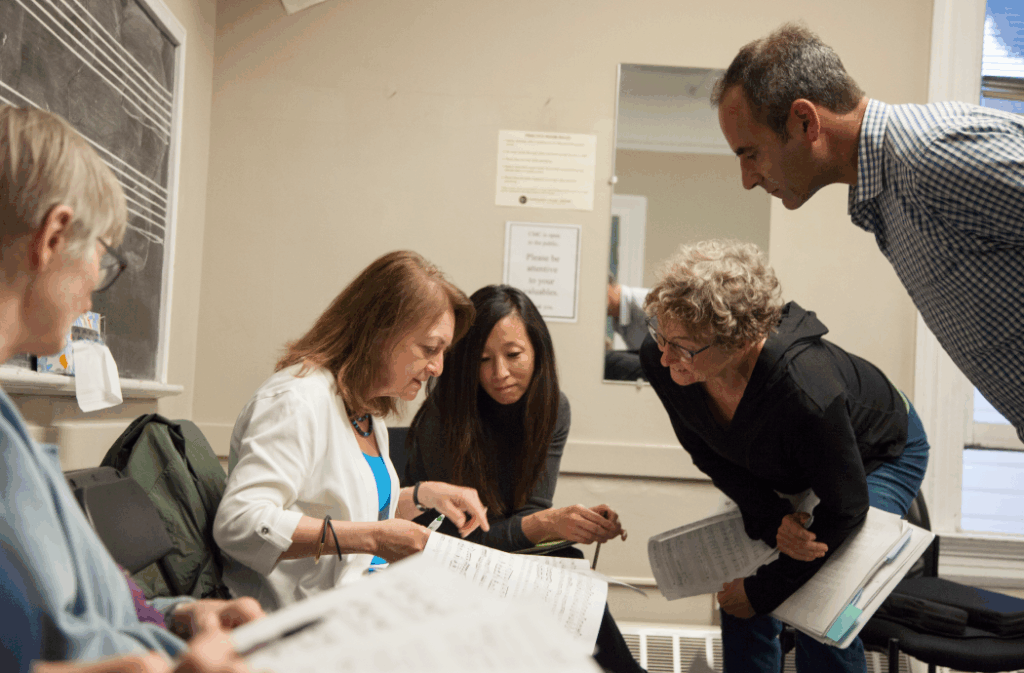For many people, music composition can feel intimidating, especially at the beginning. But CMC faculty member Jono Kornfeld believes the creative process is something everyone can access, and that trial and error, mistakes, and growth should be normalized, especially for beginners unsure of their skills.
“Even though we experience music as something linear and temporal, like a play or movie, composing often follows an out-of-order process, with lots of editing and revising. The way we enjoy a complete, uninterrupted music experience doesn’t necessarily reflect the piecemeal process its composer followed. They might write the ending first, the introduction next, and the middle last.”
Kornfeld, who also teaches at San Francisco State University and is the author of Music Theory and Notation for Intelligent Beginners, encourages students to view small musical ideas as valid starting points. “For people who haven’t tried composing, they might not realize that a significant portion of music can be generated out of a comparatively small idea. Part of the composing process is taking that small idea and developing and expanding upon it through many established techniques and practices.”
Instead of labeling something a mistake, he sees each idea as an opportunity for development and self-inquiry. “It would be hard to call something a ‘mistake’ in composition, but perhaps a student’s draft could have moments in it that seem less in line with the overall intended continuity—in that case I might ask them what their intention is in that instant.”
Sometimes students move too quickly through good ideas, assuming they have communicated enough. Kornfeld encourages them to take more time and space with their musical material. “Often students come up with good ideas, but rush through their presentation (thus feeling ‘unfinished’), thinking that the listener has ‘gotten’ the idea in what’s really a too-short amount of time. In those cases, I encourage someone to explore ways of developing it to stretch out its presence, like padding a written sentence with some adjectives or metaphors.”
A lot of learning, he says, comes from experience and hearing your own work played. “It happens a lot that someone ‘completes’ their piece and hands it off to the performer. Then the moment they hear it in the first rehearsal, they realize it’s not what they intended (I speak from my own experiences!). However, they usually figure out what to change rather quickly if not instantly. This is just a normal part of the learning process: it takes time, and trial-and-error to understand how something will actually sound as compared to how it was imagined. I suspect this is the case with most creative endeavors. My advice? It’s going to happen, so shrug it off and then fix it for the next time.”
He reminds new composers that the process does not have to feel overwhelming. “Composing can be approached through a series of smaller, bite-sized steps over time, as opposed to it all pouring out in a single bound. All it takes is one or two little ideas that I like to call ‘nuggets,’ and while the rest isn’t easy, it’s doable and often satisfying.”
What matters most is getting started, no matter your level of experience. “ If someone has even a small idea, there are many tools to turn that into something substantial. Of course being a composer requires some creativity, but it also requires a willingness to embrace the craft and process, and to know that your initial results might not live up to your ideals. You have to be willing to believe in your ideas, but also allow them to be supported and nurtured by the tools and techniques of the trade.”
To Kornfeld, composition is not about perfection. It is about trust—in your ideas, your growth, and your ability to keep shaping your music through curiosity, practice, and patience.
Jono Kornfeld is teaching a Composition Workshop at CMC this summer, open to anyone interested in exploring their musical creativity. To learn more or register, click here.



